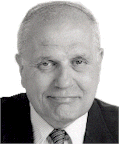|
Opening Statement by Rep. John Dingell
(D-MI).
Re: House Telecom Subcommittee Hearing on HR 850, SAFE Act.
Date: May 25, 1999.
The page contains two versions: a transcription of the statement as delivered by Rep.
Dingell, and a text of the statement published in the House Commerce Committee Democrats
web site. The two versions differ significantly. The former document was created by Tech
Law Journal by transcribing from a poor quality audio recording of the hearing. |
|
 |
|
Statement as Delivered
Mr. Chairman, thank you for the recognition. And, Mr. Chairman, thank you for holding
this hearing today, which is very important.
This is not an easy subject. The Committee has grappled with this matter for a number
of years. Unfortunately, we have had little success in finding the right solution. As each
day goes by, technological advances create an even greater need for a coherent national
policy.
I hope that as the need for a solution becomes more compelling, this Committee will
redouble its efforts to find a sensible rational middle ground that balances the crucial
interests at stake.
We lead the world in the production of computer hardware and software. Technology is an
engine which drives the global economy and drives the U.S. economy. We must not sit idly
by and let U.S. companies lose their edge in the world market place because they cannot
deliver the kind of secure products and services that customers demand.
But, as I’m sure we’ll hear from our witnesses today, the advent of
increasingly sophisticated technology is a double-edged sword. While it can make global
commerce and communications more secure, it can make national security and law enforcement
less so. We all know too well that even in the post-Cold War era, the wars against
international terrorism, espionage, and human rights abuses continue unabated.
A significant threat exists to this country from activities of people from out ___,
both in the military and espionage sense, but also from the standpoint of crime, drugs,
and ___ of that sort.
Mr. Chairman, we have an important duty to see to it that we protect all of the vital
interests of the United States in foreign commerce and communications. Thus, we have an
important need to address the terrific concerns of the administration with regard to
security. Very very difficult. And I am not quite sure how it has been done, or how it can
be done, or how it will be done. But I hope that we will work very hard on this particular
point, and sit around, trying to figure out -- craft a sensible ___ encryption policy we
can all support.
I yield back the balance of my time.
Commerce Committee Democrats web site version
STATEMENT
OF
THE HONORABLE JOHN D. DINGELL
SUBCOMMITTEE ON TELECOMMUNICATIONS
TRADE, AND CONSUMER PROTECTION
HEARING ON
H.R. 850, THE SECURITY AND FREEDOM
THROUGH ENCRYPTION (SAFE) ACT
May 25, 1999
I thank you, Mr. Chairman, for recognizing me, and want to commend you for holding this
important hearing today.
The subject at hand is not an easy one. This Committee – and several others in
Congress – have grappled with encryption policy for years. Unfortunately, we have had
little success so far in finding the right solution. And, as each day goes by,
technological advances create an even greater need for a coherent national policy.
Mr. Chairman, I hope that as the need for a solution becomes more compelling, this
Committee will redouble its efforts to find a rational middle ground that balances the
crucial interests at stake.
Our country leads the world in the production of computer hardware and software, and
technology is now the engine that drives the global economy. We must not sit idly by and
let U.S. companies lose their edge in the world market because they can’t deliver the
kind of secure products and services that customers demand.
But, as I’m sure we’ll hear from our witnesses today, the advent of
increasingly sophisticated technology is a double-edged sword. While it can make global
commerce and communications more secure, it can make national security and law enforcement
less so. We all know too well that even in the post-Cold War era, the wars against
international terrorism, espionage, and human rights abuses continue unabated.
Mr. Chairman, it is clearly the duty of this Congressional committee to make sure that
the vital interests of the United States in foreign commerce and communications are
protected. In carrying out that responsibility, we must take the lead in thoroughly
understanding the role of encryption, and carefully consider the legitimate concerns of
both sides of this debate.
Both law enforcement and the business community insist that a balanced and reasonable
encryption policy is their goal. My hope is that the distinguished witnesses before us
today will shed light on ways to achieve that goal.
Again, I commend you for holding this hearing, Mr. Chairman, and I look forward to
working with you to craft an encryption policy that we can all support. I yield back the
balance of my time.
